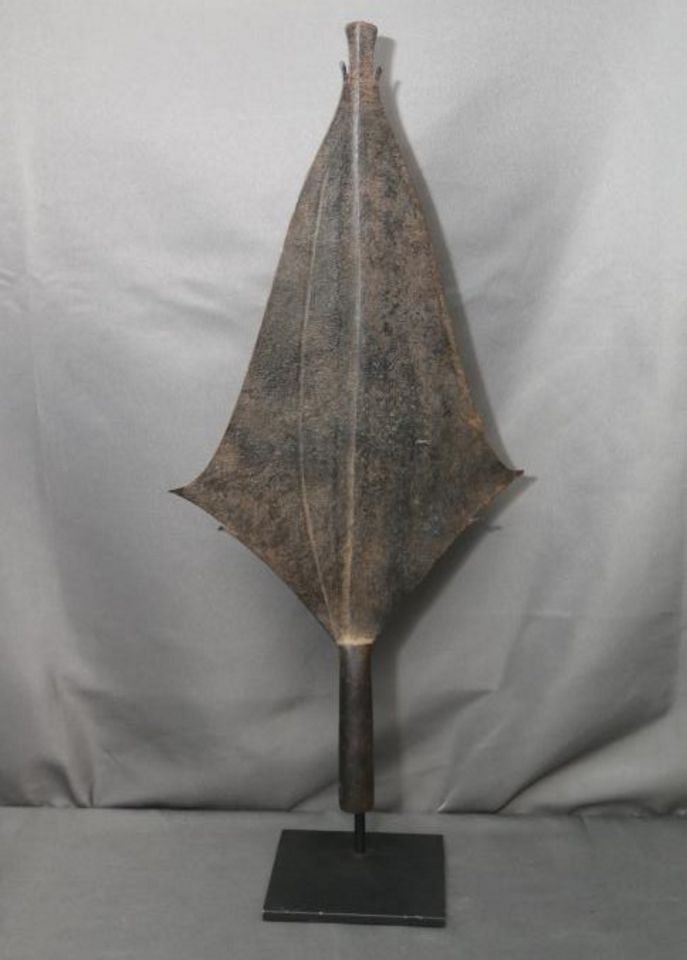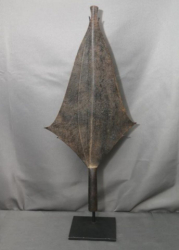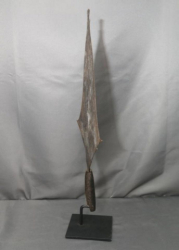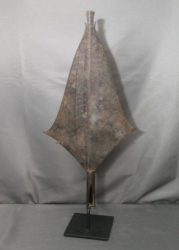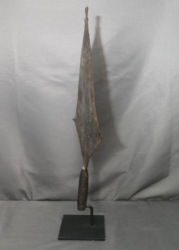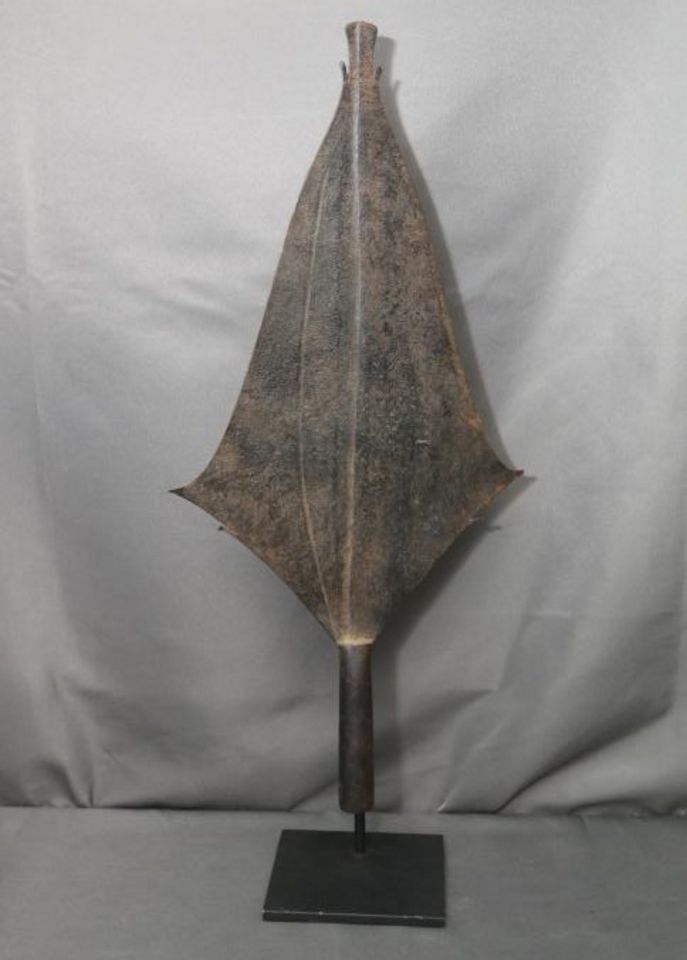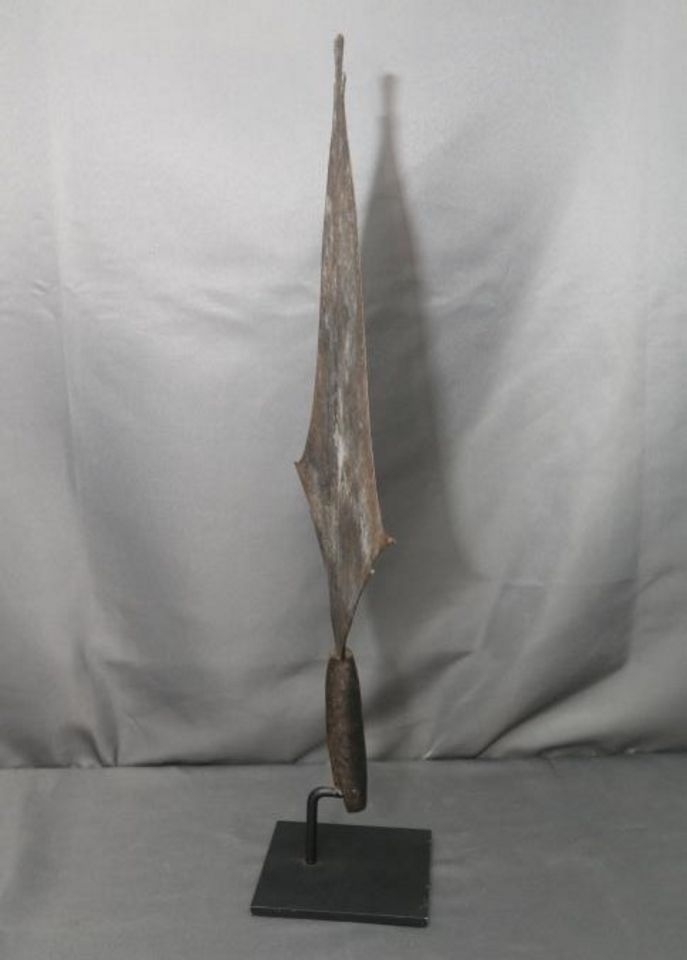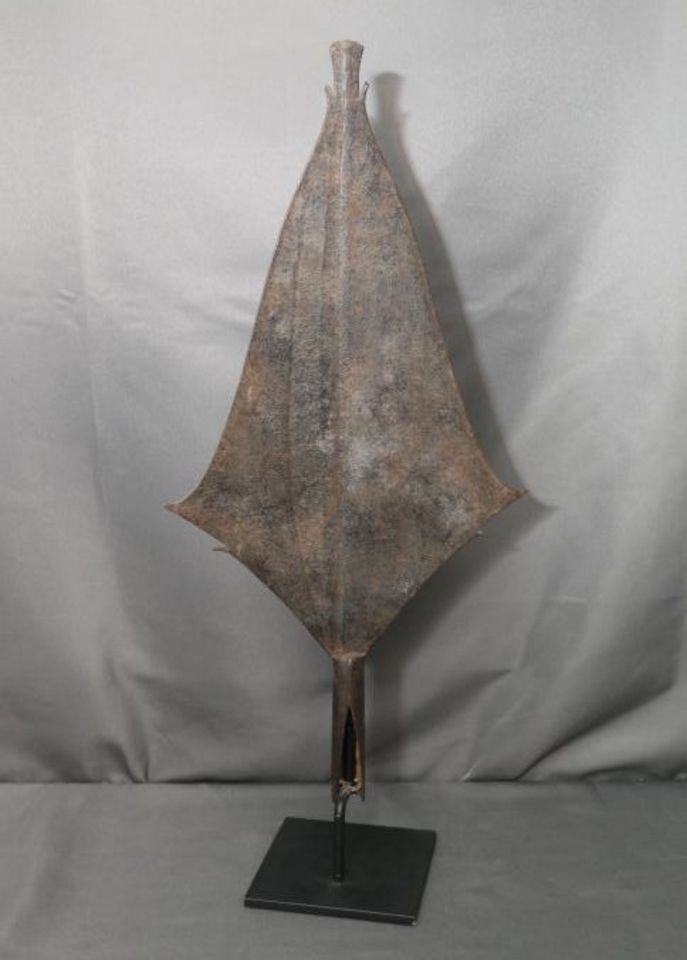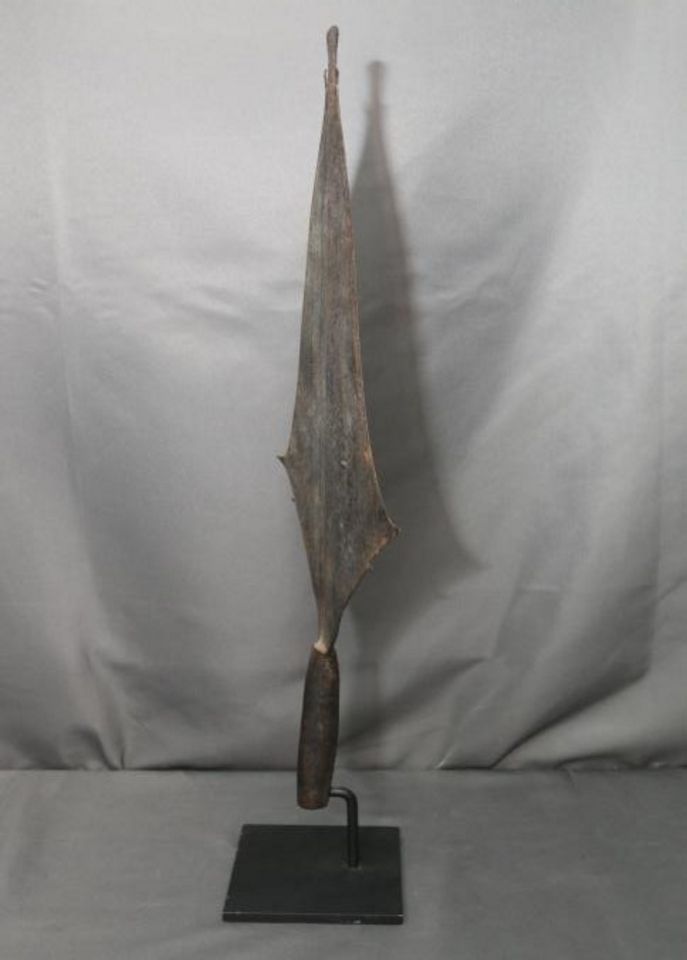Items located in Pleasant Valley, NY. Items include Asafo militia flag, Fante people, Ghana; gong rattle, Chamba people, Cameroon & Nigeria; blacksmith tools, Soninke people, Gambia; ceremonial fetish, Fon people; traditional women's hair pins, Bozo people, Mali; oil lamps, Dogon people, Mali; Cheetem rod currency, Anang people, Nigeria; wedding blanket, Fulani people, Mali or Niger; torque neck ring, Yoruba people, Nigeria; Cache Sexe ring, Kirdipeople, Cameroon & Northeast Nigeria; West African bells, Yoruba People, Nigeria; Duge necklaces, Dogon people, Mali and more.
AFRICAN ART COLLECTION OF MARY SUE AND PAUL PETER ROSEN
Mary Sue and Paul Peter Rosen have collected African art for over thirty years, making nine trips to Africa to study the art in its cultural setting. The Rosens have published three African art books, curated more than ten exhibitions from their collection, and have given public lectures about African art and culture. They have donated art from their collection to various institutions including the Newark Museum, Temple University in Philadelphia, the SMA Fathers African Art Museum in Tenafly, New Jersey, and the African American Research Library in Fort Lauderdale, Florida.
Payment is due by Friday, September 27 at 1PM.
Pickup in Pleasant Valley, NY must be completed by Friday, September 27 at 3PM.
All lots sold as is, where is. There is a 15% Buyers Premium for all lots purchased. Payment methods include cash, MC, Visa, Discover or good check. You can make credit card payment online by going to your Member Area and selecting your invoice.
*NOTE* Shipping is available on all items.
AFRICAN ART COLLECTION OF MARY SUE AND PAUL PETER ROSEN
Mary Sue and Paul Peter Rosen have collected African art for over thirty years, making nine trips to Africa to study the art in its cultural setting. The Rosens have published three African art books, curated more than ten exhibitions from their collection, and have given public lectures about African art and culture. They have donated art from their collection to various institutions including the Newark Museum, Temple University in Philadelphia, the SMA Fathers African Art Museum in Tenafly, New Jersey, and the African American Research Library in Fort Lauderdale, Florida.
Payment is due by Friday, September 27 at 1PM.
Pickup in Pleasant Valley, NY must be completed by Friday, September 27 at 3PM.
All lots sold as is, where is. There is a 15% Buyers Premium for all lots purchased. Payment methods include cash, MC, Visa, Discover or good check. You can make credit card payment online by going to your Member Area and selecting your invoice.
*NOTE* Shipping is available on all items.
Auction Info
Items located in Pleasant Valley, NY. Items include Asafo militia flag, Fante people, Ghana; gong rattle, Chamba people, Cameroon & Nigeria; blacksmith tools, Soninke people, Gambia; ceremonial fetish, Fon people; traditional women's hair pins, Bozo people, Mali; oil lamps, Dogon people, Mali; Cheetem rod currency, Anang people, Nigeria; wedding blanket, Fulani people, Mali or Niger; torque neck ring, Yoruba people, Nigeria; Cache Sexe ring, Kirdipeople, Cameroon & Northeast Nigeria; West African bells, Yoruba People, Nigeria; Duge necklaces, Dogon people, Mali and more.
AFRICAN ART COLLECTION OF MARY SUE AND PAUL PETER ROSEN
Mary Sue and Paul Peter Rosen have collected African art for over thirty years, making nine trips to Africa to study the art in its cultural setting. The Rosens have published three African art books, curated more than ten exhibitions from their collection, and have given public lectures about African art and culture. They have donated art from their collection to various institutions including the Newark Museum, Temple University in Philadelphia, the SMA Fathers African Art Museum in Tenafly, New Jersey, and the African American Research Library in Fort Lauderdale, Florida.
Payment is due by Friday, September 27 at 1PM.
Pickup in Pleasant Valley, NY must be completed by Friday, September 27 at 3PM.
All lots sold as is, where is. There is a 15% Buyers Premium for all lots purchased. Payment methods include cash, MC, Visa, Discover or good check. You can make credit card payment online by going to your Member Area and selecting your invoice.
*NOTE* Shipping is available on all items.
AFRICAN ART COLLECTION OF MARY SUE AND PAUL PETER ROSEN
Mary Sue and Paul Peter Rosen have collected African art for over thirty years, making nine trips to Africa to study the art in its cultural setting. The Rosens have published three African art books, curated more than ten exhibitions from their collection, and have given public lectures about African art and culture. They have donated art from their collection to various institutions including the Newark Museum, Temple University in Philadelphia, the SMA Fathers African Art Museum in Tenafly, New Jersey, and the African American Research Library in Fort Lauderdale, Florida.
Payment is due by Friday, September 27 at 1PM.
Pickup in Pleasant Valley, NY must be completed by Friday, September 27 at 3PM.
All lots sold as is, where is. There is a 15% Buyers Premium for all lots purchased. Payment methods include cash, MC, Visa, Discover or good check. You can make credit card payment online by going to your Member Area and selecting your invoice.
*NOTE* Shipping is available on all items.
Categories:
CEREMONIAL SPEAR HEAD CURRENCY. Mbole people, Congo. The rhomboid form of this object is derived from the point of a spear. It originated in the centuries-old tradition of a man planting one or more spears in the ground in front of his spouses's house to establish that he had paid the required dowry and to discourage any other suitors. Over time, spears which were actual weapons became transformed into these non-functional, decorative forms. The socket at the bae of the spear head was set on a tapered iron rod which was plunged firmly into the ground. On custom base. Hand forged by a blacksmith in Opala village. Iron. H18. 5in.
More Details
CEREMONIAL SPEAR HEAD CURRENCY. Mbole people, Congo. The rhomboid form of this object is derived from the point of a spear. It originated in the centuries-old tradition of a man planting one or more spears in the ground in front of his spouses's house to establish that he had paid the required dowry and to discourage any other suitors. Over time, spears which were actual weapons became transformed into these non-functional, decorative forms. The socket at the bae of the spear head was set on a tapered iron rod which was plunged firmly into the ground. On custom base. Hand forged by a blacksmith in Opala village. Iron. H18. 5in.
High Bid:
$110.00 – jonned
Auction Type: One Lot
Quantity: 1
Bidding has closed on this lot

